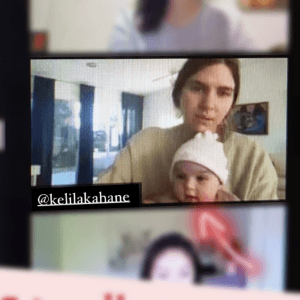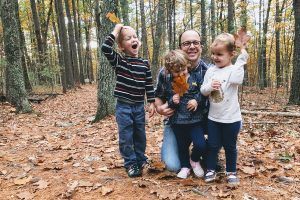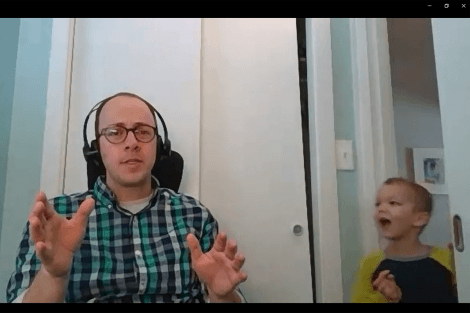April 9, 2021—In her work as a social scientist, Elizabeth Perry, DrPH ’23, uses behavioral research to nudge people towards making better choices, such as saving for retirement or getting vaccinated for COVID-19. But on a recent afternoon, she had a different behavior challenge to contend with—that of a bored kid in search of snacks.
As Perry worked on a group project with fellow Harvard T.H. Chan School of Public Health students over Zoom, she tried to focus on the complex statistical problems at hand while also keeping part of her brain tuned to her 8-year-old son’s movements in the house. But the work demanded close concentration, and her attention eventually shifted more fully to the screen. Soon, however, she saw movement in her Zoom background.
“My son had taken a stool and was trying to climb up to reach some potato chips that I had put in a cupboard out of reach. He was sort of leaning over,” she said, miming his sneaky, precarious move. Perry quickly intervened. “My group members thought it was hilarious.”
Perry and other students with kids have become much more visible to their professors and classmates this past year, as the pandemic has blurred the lines between home and the outside world, and schools and daycare centers have closed. For high achievers accustomed to putting their best selves forward in professional and academic settings, the adjustment to a new, messier normal has brought plenty of stress. To get through it all, Perry realized last fall, student parents needed to come together.
Working with other parents in her DrPH cohort, Perry launched a group called Parents@Chan. It has grown by word of mouth to about 24 mothers and fathers. Through meetings and an active WhatsApp group, the students swap advice on everything from what classes to take to where to find good daycare, and offer each other support through the rough moments. Perry said, “It’s about connecting us, giving a space where we can be clear and open about what we’re going through, and where we can hold each other up as needed.”

The group’s faculty advisor Anna Sinaiko, assistant professor of health economics and policy, and a parent herself, said she was glad to see that the School supported the creation of the group. She said she hopes that, going forward, the School will make more students aware of the group, and also learn from its members about the resources and support that parents need to be successful.
Just knowing that there are other parents going through similar challenges helps, said Kelila Kahane, MPH ’21. While Perry has several fellow parents in her cohort, Kahane—a medical student attending Harvard Chan between her third and fourth years—has been the only parent in her classes.
Lessons from the pandemic

Adele Houghton, DrPH ’23, hopes that one of the legacies of the pandemic will be a lasting acknowledgement that people have lives outside of the classroom or workplace. Houghton, an architect and green building specialist, has two children, ages 6 and 4. She has advocated for accommodation to parental schedules in her program’s extracurricular programming, suggesting that some happy hour events might instead be held over lunch. “Happy hour for parents comes after dinner, bath, bedtime,” she joked.
Perry noted that her classmates have come to see her tight schedule—and the laser focus it requires—as an asset. For example, a discussion around the topic for a group project might have taken much longer had she not established a firm time when she needed to leave to take care of her son. And on a much deeper level, she said that parents have unique insights to share that can help everyone’s learning experience.

Kahane noted that being a new parent has enhanced her understanding of public health. “I’m passionate about mental health, and being able to see the dramatic impact of early learning experience makes issues around child health disparities very real and personal,” she said.
Over the past year, Griffin Jones, DrPH ’22, has thought a lot about how the trauma of the pandemic may be affecting the future health and well-being of children, including his son, 5, and twin daughters, 3. But he’s been grateful for the chance to be there for moments like his son’s first day of Zoom kindergarten this past fall. The occasion made him feel optimistic about children’s resilience, he said, recalling how excited his son was to meet his new classmates, even during a pandemic. “He was just beaming.”
Photos: Courtesy of Griffin Jones and Kelila Kahane
